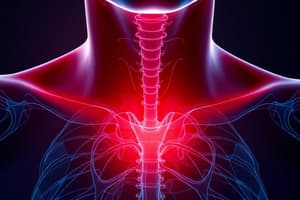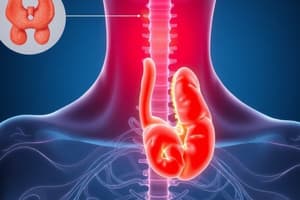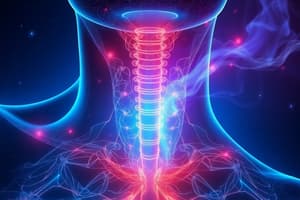Podcast
Questions and Answers
What are the classic symptoms of hypermetabolism?
What are the classic symptoms of hypermetabolism?
Weight loss, increased heart rate, increased blood pressure, hyperpersonality, heat intolerance, and exophthalmos.
What precautions should be taken after a patient undergoes radioactive iodine treatment for hyperthyroidism?
What precautions should be taken after a patient undergoes radioactive iodine treatment for hyperthyroidism?
The patient must flush three times after urinating, call the hazmat team if urine spills, and needs a private room for the first 24 hours with visitor restrictions.
What is the significance of a total thyroidectomy in terms of hormone replacement?
What is the significance of a total thyroidectomy in terms of hormone replacement?
A total thyroidectomy requires lifelong hormone replacement and puts the patient at risk for hypocalcemia due to possible damage to the parathyroid glands.
What are the symptoms associated with hypocalcemia?
What are the symptoms associated with hypocalcemia?
What is the immediate treatment for a thyroid storm?
What is the immediate treatment for a thyroid storm?
What are the potential risks during the first 12 hours after a total thyroidectomy?
What are the potential risks during the first 12 hours after a total thyroidectomy?
What is PTU’s primary use in treating hyperthyroidism?
What is PTU’s primary use in treating hyperthyroidism?
What is the difference between a total and subtotal thyroidectomy regarding hormone replacement?
What is the difference between a total and subtotal thyroidectomy regarding hormone replacement?
What are some examples of verbal toys for infants age 9 months and older?
What are some examples of verbal toys for infants age 9 months and older?
What type of play do toddlers typically engage in, and what are their best toys?
What type of play do toddlers typically engage in, and what are their best toys?
What are the key developmental skills that preschoolers aged 3 to 6 years work on?
What are the key developmental skills that preschoolers aged 3 to 6 years work on?
Identify the three characteristics that define play for school-age children from 7 to 11 years.
Identify the three characteristics that define play for school-age children from 7 to 11 years.
How does peer group association impact play for adolescents aged 12 to 18 years?
How does peer group association impact play for adolescents aged 12 to 18 years?
What restrictions should be followed for a patient who has recently undergone laminectomy?
What restrictions should be followed for a patient who has recently undergone laminectomy?
What types of toys are beneficial for encouraging cooperative play in preschoolers?
What types of toys are beneficial for encouraging cooperative play in preschoolers?
In what ways do toddlers develop gross motor skills?
In what ways do toddlers develop gross motor skills?
What is the primary concern in the first 12 to 48 hours post-thyroid surgery?
What is the primary concern in the first 12 to 48 hours post-thyroid surgery?
Why should Synthroid not be withheld before surgery?
Why should Synthroid not be withheld before surgery?
What characterizes myxedema coma?
What characterizes myxedema coma?
Why are patients with Addison disease at risk under stress?
Why are patients with Addison disease at risk under stress?
What are common symptoms associated with Cushing's syndrome?
What are common symptoms associated with Cushing's syndrome?
What nursing action should be taken when a patient is on Solu-Medrol?
What nursing action should be taken when a patient is on Solu-Medrol?
What does the stress response aim to maintain?
What does the stress response aim to maintain?
What can happen if a patient with Addison’s disease undergoes a bilateral adrenalectomy?
What can happen if a patient with Addison’s disease undergoes a bilateral adrenalectomy?
Why are hard plastic toys preferable for immunosuppressed children?
Why are hard plastic toys preferable for immunosuppressed children?
What is the best toy for infants aged 0 to 6 months?
What is the best toy for infants aged 0 to 6 months?
What should be avoided for children over 6 months due to safety concerns?
What should be avoided for children over 6 months due to safety concerns?
What does the concept of object permanence signify for children aged 6 to 9 months?
What does the concept of object permanence signify for children aged 6 to 9 months?
What medication is commonly prescribed for hypothyroidism?
What medication is commonly prescribed for hypothyroidism?
What are some physical characteristics seen in a patient with Cushing’s syndrome?
What are some physical characteristics seen in a patient with Cushing’s syndrome?
Flashcards
Hyperthyroidism
Hyperthyroidism
An overactive thyroid gland results in increased metabolism, leading to symptoms like weight loss, increased heart rate and blood pressure, hyperactivity, heat intolerance, and bulging eyes (exophthalmos).
Hypothyroidism
Hypothyroidism
A condition where the thyroid gland is underactive, leading to a slowed metabolism, fatigue, weight gain, cold intolerance, and slowed heart rate.
Cushing Syndrome
Cushing Syndrome
A condition where the adrenal glands produce too much cortisol, leading to symptoms like weight gain, high blood pressure, high blood sugar, muscle weakness, and mood changes.
Addison Disease
Addison Disease
Signup and view all the flashcards
Subtotal Thyroidectomy
Subtotal Thyroidectomy
Signup and view all the flashcards
Total Thyroidectomy
Total Thyroidectomy
Signup and view all the flashcards
Thyroid Storm
Thyroid Storm
Signup and view all the flashcards
Laminectomy
Laminectomy
Signup and view all the flashcards
Purposeful Play
Purposeful Play
Signup and view all the flashcards
Gross Motor Play
Gross Motor Play
Signup and view all the flashcards
Parallel Play
Parallel Play
Signup and view all the flashcards
Fine Motor Play
Fine Motor Play
Signup and view all the flashcards
Cooperative Play
Cooperative Play
Signup and view all the flashcards
School Age Play
School Age Play
Signup and view all the flashcards
Laminectomy Restrictions
Laminectomy Restrictions
Signup and view all the flashcards
Myxedema Coma
Myxedema Coma
Signup and view all the flashcards
Myxedema
Myxedema
Signup and view all the flashcards
Stress Response
Stress Response
Signup and view all the flashcards
Addisonian Crisis
Addisonian Crisis
Signup and view all the flashcards
Hypometabolism
Hypometabolism
Signup and view all the flashcards
Glucocorticoids
Glucocorticoids
Signup and view all the flashcards
Striae
Striae
Signup and view all the flashcards
Hirsutism
Hirsutism
Signup and view all the flashcards
Fomite
Fomite
Signup and view all the flashcards
Study Notes
Thyroid Disorders
-
Hyperthyroidism (Hypermetabolism): Characterized by increased metabolic rate.
- Symptoms: Weight loss, elevated heart rate (HR) and blood pressure (BP), hyperactivity, heat intolerance, and bulging eyes (exophthalmos).
- Causes: Often associated with Graves' disease.
- Treatment:
- Radioactive iodine: Destroys thyroid tissue, requires patient to flush three times after urination, and be in a private room for the first 24 hours. Visitors restricted for the first 24 hours at home also.
- Propylthiouracil (PTU): Suppresses thyroid hormone production. Monitor white blood cell (WBC) count due to immunosuppressant effects.
- Thyroidectomy: Surgical removal of the thyroid. Differentiate between total (lifelong hormone replacement, risk of hypocalcemia) and subtotal (may need initial supplementation, risk of thyroid storm).
-
Hypothyroidism (Hypometabolism): Characterized by decreased metabolic rate.
- Symptoms: Weight gain, decreased heart rate and blood pressure, lethargy, and cold intolerance, Academically challenged, potentially flat personality .
- Severe hypothyroidism: Myxedema, displaying skin involvement, potentially progressing to myxedema coma leading to decreased mental status, hypothermia, and slowing of organ function. medical emerency.
- Treatment: Levothyroxine (Synthroid) taken in the morning on an empty stomach with water.
- Pre-op considerations -Avoid sedation. -Clarify NPO orders if on Synthroid, the patient must take their thyroid medication before surgery.
- Symptoms: Weight gain, decreased heart rate and blood pressure, lethargy, and cold intolerance, Academically challenged, potentially flat personality .
Adrenal Cortex Diseases
-
Addison Disease (Hypoadrenalism): Under-secretion of adrenal cortex hormones.
- Symptoms: Hyperpigmentation (tanning), inability to adapt to stress.
- Crisis: Under stress, patients can go into shock and hypoglycemic episode (Addisonian crisis).
- Treatment: Steroid replacement with glucocorticoid drugs (e.g., prednisone, methylprednisone).
- Purpose of stress response: Maintenance of normal blood pressure and adequate glucose levels.
-
Cushing's Syndrome: Over-secretion of adrenal cortex hormones.
- Symptoms: "Cushingoid" appearance: Moon face, truncal obesity, thin extremities, hirsutism, gynecomastia, buffalo hump, stretch marks, water retention (high Na+, low K+), high serum glucose (requiring frequent blood glucose checks), easy bruising, and irritability or depression. Immunosuppression possible.
- Treatment: Adrenalectomy (surgical removal).
- Bilateral adrenalectomy leads to Addison's disease and requires hormone replacement therapy. Treatment takes a year or so after titration for the patient to return to normal.
Toys
- Safety: Consider size (avoid small toys for children under 4), age appropriateness (according to Piaget's stages), and feasibility.
- Avoid metal or dye-cast toys, especially when oxygen is in use.
- Hard plastic is a safe choice for disinfectability.
- Age-appropriate toys:
- Infants (0-6 months): Musical mobiles, large soft toys. Musical mobiles should be avoided past 6 months of age due to strangulation risk.
- 6-9 months: Cover/uncover toys (e.g., Jack-in-the-box, peek-a-boo).
- 9-12 months: Speaking or verbal toys.
- 1-3 years (toddlers): Gross motor toys (e.g., push/pull toys).
- 3-6 years (preschoolers): Fine motor toys, and cooperative and imaginative play.
- 7-11 years (school-age): Creative, collective (e.g., trading cards, toys), and competitive toys.
- 12-18 years (adolescents): Peer-group oriented. Important considerations to note when evaluating adolescents for surgical recovery.
Laminectomy
- Post-op considerations:
- Never lift by bending at the waist. Use knees for lifting.
- Never lift anything over the head.
- Avoid horseback riding, off-trail biking, and jerky amusement park rides.
- Important note: Laminectomy information is valuable in answering spinal cord questions. Focus on the location-specific restrictions.
Studying That Suits You
Use AI to generate personalized quizzes and flashcards to suit your learning preferences.




